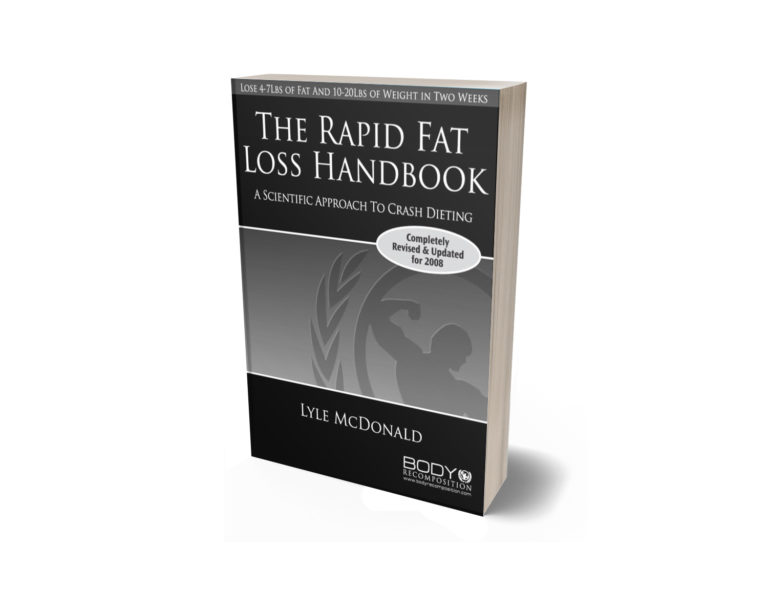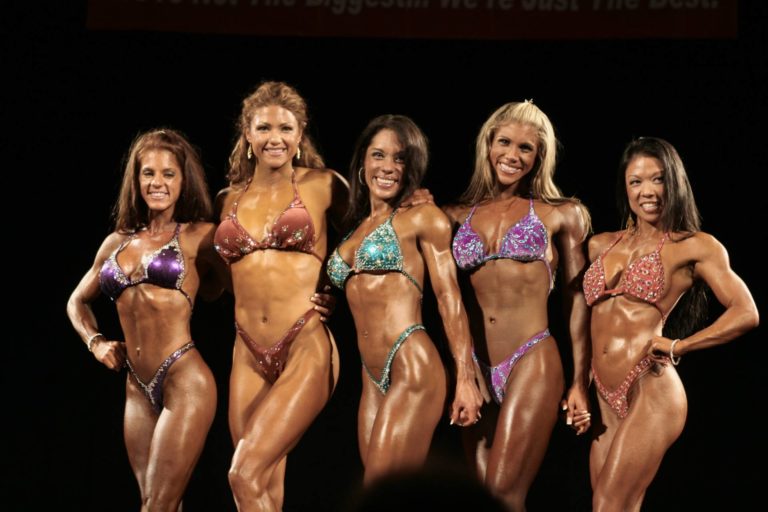
Strength Sensei Bookshelf
The Rapid Fat Loss Handbook
In 1998 Lyle McDonald published The Ketogenic Diet, a 323-page masterpiece on the science of low-carb dieting. Another treatise that belongs on the bookshelf of any serious personal trainer or strength coach is The Rapid Fat Loss Handbook: A Scientific Approach to Crash Dieting.
We live in a world of instant gratification, and fat loss is no exception. Consider, for example, the popularity of The Biggest Loser, the reality television series that featured celebrity trainers Jillian Michaels and Bob Harper. The premise of the show was to have contestants lose weight as much weight as quickly as possible, and one way was through radical changes in their diets. Although this TV program inspired countless viewers to get fit and lean, crash dieting comes with risks.
Before starting any crash diet, a consultation with a doctor is always recommended. In 1988, Oprah Winfrey lost 67 pounds in four months on a medically-supervised, low calorie diet using liquid protein. However, her program was controversial because liquid protein diets were associated with 88 deaths in the 70s and early 80s.

One of the issues with earlier liquid protein diets is they did not recommend vitamin- mineral supplements, leaning to deficiencies that cause health issues, and that the protein source was of poor quality. McDonald prefers to use whole foods and not rely on protein drinks. And although pre-packaged meal plans are convenient, they don’t teach you how to eat well when you achieve your weight-loss goal. In fact, just two weeks after Winfrey’s 67-pound reveal, she admitted that she gained 10 pounds.
The subtitle of McDonald’s book is “How to Lose 4-7 Pounds of Fat and 10-20 Pounds of Weight in Two Weeks,” because many who used his program achieved these results. He makes the distinction between fat and weight because low carbohydrate diets cause dehydration, and being able to control water balance is important for those athletes involved in weight division sports.
It’s not unusual, for example, for elite boxers and MMA fighters to lose a dozen pounds the week of a fight to compete in a lower weight class. Cristiane “Cyborg” Justino told Rolling Stone magazine in one interview that she needed to lose 18 pounds in just four days to make weight for one of her fights. And MMA legend Anderson Silva would cut 30 pounds off of his normal bodyweight to of 215 pounds to compete in his optimal weight class.
Although the water weight will quickly come back, the plus side is that the rapid dehydration can help fighters reach their desired weight class. For those non-athletes who are simply overweight, losing a large amount of weight quickly may serve as motivation to continue striving to seek out methods to achieve optimal body composition.
McDonald’s program involves having the dieter estimate their protein requirements by determining their bodyfat percentage and calculating their activity level. This is necessary because the diet is primarily protein. The higher the protein intake, the higher the calorie intake.
The meals McDonald recommends are rather boring and monotonous. A lean protein source, a fibrous vegetable, and supplements such as a multi-vitamin (calcium, magnesium, and potassium are especially important), and fish oil for essential fatty acids. The supplements are necessary because the meals do not have enough variety to ensure all nutritional requirements are met.
McDonald graduated from UCLA with a degree in kinesiology. He prefers weight training over cardio as it will help the dieter maintain muscle mass. Muscle mass is an active tissue that burns calories, so preserving muscle mass enables the dieter to consume more calories while losing fat.

How long you should use McDonald’s diet depends on how much weight you want to lose. For those who are already lean, may only recommend using the diet for two weeks as it can cause muscle loss. Also, McDonald has several chapters in the book showing how to transition from this diet into a less-extreme diet or a maintenance diet.
The Rapid Fat Loss Handbook is a short-term crash diet, and there are risks associated with it and any other type of crash diet. With that warning, let’s leave you with Lyle McDonald’s own words:
“The bottom line is this, no matter what I or anybody else says about it, people are going to crash diet. Sometimes it’s necessary or beneficial, other times it’s not. Regardless, people are going to do it. With that realization made, I figure that the least that can be done is to make sure that such crash diets are done as safely and as intelligently as possible. Using nutritional science and research, we can develop a crash diet that isn’t totally stupid, that will be safe and sane (within the limits of crash dieting) at least compared to everything else that’s out there.”
[Note: Lyle McDonald’s The Rapid Fat Loss Handbook: A Scientific Approach to Crash Dieting has been updated from its original version, and can be purchased at Amazon.com.]
Bodybuilding photos by Miloš Šarčev
For monthly fat loss programming and informational content, check out our Dojo of Strength. To learn how to program effectively and help your clients cut weight or lose fat, sign up for an upcoming seminar or e-course.
